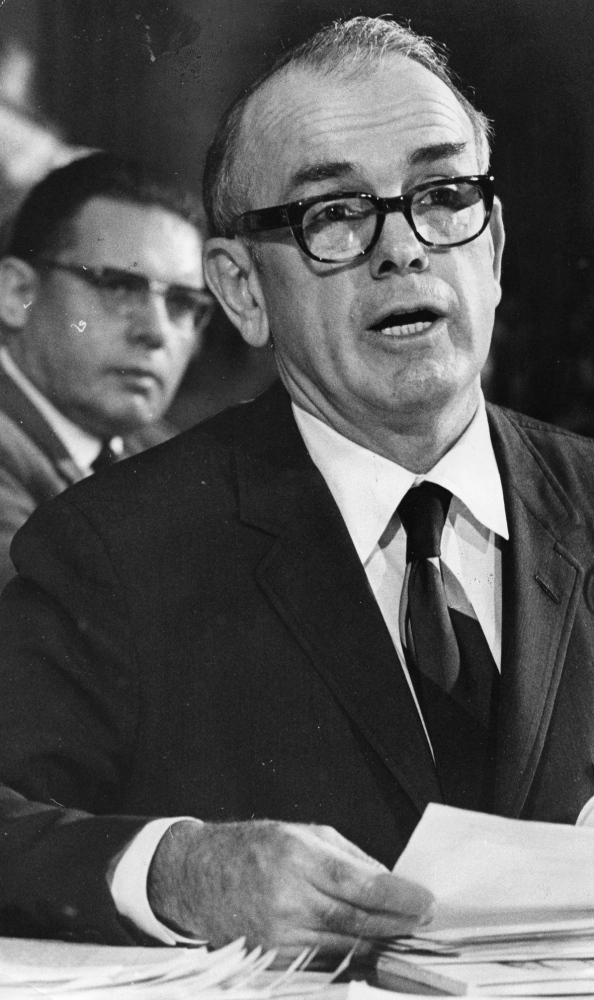Randolph Thrower, who served two years as commissioner of the Internal Revenue Service under President Richard Nixon before clashing with the administration over appointments and its efforts to punish political enemies, died March 8 at his home in Atlanta. He was 100.
A daughter, Patricia Barmeyer, confirmed the death but did not specify a cause.
Thrower had been a tax lawyer and Republican official in Atlanta before being tapped to head the IRS in 1969. In his two years on the job, he introduced a number of reforms, including a simplified, one-page version of Form 1040, the standard individual income-tax form.
He also was instrumental in drafting the Tax Reform Act of 1969, which reduced taxes for people with lower incomes and raised taxes on capital gains. In 1970, he overturned an IRS ruling that had allowed segregated private schools in the South to claim tax exemptions.
It was only after he left his position in 1971 that Thrower’s battles with the Nixon White House came to light. He had agreed in 1969 to set up a special group to investigate the tax-exempt status of “subversive organizations of all kinds.”
As time went on, Thrower grew increasingly resistant to the strong-arm tactics of the Nixon administration. In 1973, he revealed to a Senate select committee investigating the Watergate scandal that in 1970 the White House asked Thrower to hire John Caulfield, a top lieutenant of Nixon aide John Ehrlichman, to lead the Bureau of Alcohol, Tobacco and Firearms, then a branch of the IRS.
After Thrower rejected Caulfield, who was known for his phone-tapping skills and other “dirty tricks,” the next applicant offered by the White House for the job was G. Gordon Liddy, later convicted as a Watergate conspirator. Thrower turned him down as well.
The White House then demanded that Thrower hire Caulfield to lead a special enforcement unit at the IRS, under Thrower’s direct control. He again refused, saying the IRS commissioner had no need for “a personal police force.”
Documents later provided to congressional committees indicated that the White House asked Thrower to direct the IRS to audit the tax returns of Nixon’s opponents, including journalists, Democratic congressmen and leaders of the antiwar and civil rights movements.
“There was a great suspicion at the White House that IRS was Democratically oriented,” Thrower told the New York Times in 1974. “I had dealt with the service for many years as a tax lawyer, and I knew them to be highly professional and objective.”
Believing that Nixon would be alarmed by such partisan meddling, Thrower sent a memorandum to the president, requesting a meeting. Instead, Thrower received a phone call from Ehrlichman, telling him he was fired.
Thrower announced his resignation for “personal reasons” on Jan. 26, 1971. Five days earlier, in a private memo, later made public, Nixon had written: “May I simply reiterate for the record that I wish Randolph Thrower, commissioner of the Internal Revenue Service, removed at the earliest feasible opportunity.”
Randolph William Thrower was born Sept. 5, 1913, in Tampa, Fla. After the death of his father, he was raised largely by his grandparents in Atlanta, where he attended a military school.
After graduating in 1934 from Emory University in Atlanta and from Emory’s law school two years later, Thrower began to practice law. In the early 1940s, he worked as an FBI special agent in New York before serving as a Marine Corps officer during World War II. He lost a race for Congress as a Republican in 1956 but remained active in Republican circles in Georgia.
Thrower’s legal specialty was taxation, but he also handled civil rights appeals throughout his life and was a founding member of the Lawyers’ Committee for Civil Rights Under Law, a group launched by President John Kennedy to provide legal support for the civil rights movement.
He was chairman of Atlanta’s Board of Ethics throughout the 1980s and held leadership positions with the American Bar Association. In 1987, he was a member of the ABA’s first Commission on the Status of Women in the Profession, which was chaired by Hillary Clinton.
Thrower argued several cases before the U.S. Supreme Court, and in 1989, he submitted an amicus curiae brief to the high court in the case of Texas v. Johnson, supporting the right of a citizen to burn the U.S. flag as an act of free speech. The Supreme Court held that act of flag-burning was protected by the First Amendment.
In 1993, Thrower received the ABA’s highest award for contributions to the legal profession.
His wife of 70 years, Margaret Munroe Thrower, died in 2009. Survivors include five children, Margaret MacCary and Laura Harris, both of New York City, Patricia Barmeyer of Atlanta, Randolph Thrower Jr. of Decatur, Ga., and Mary Wickham of Richmond, Va.; 11 grandchildren; and nine great-grandchildren.
A few years after he left his post as IRS commissioner, Thrower returned to Washington with an Atlanta colleague and visited IRS headquarters on business, Barmeyer recalled. As word spread that he was in the building, IRS staffers emerged from their offices, spontaneously applauding as Thrower walked through the halls.
Copy the Story LinkSend questions/comments to the editors.



Success. Please wait for the page to reload. If the page does not reload within 5 seconds, please refresh the page.
Enter your email and password to access comments.
Hi, to comment on stories you must . This profile is in addition to your subscription and website login.
Already have a commenting profile? .
Invalid username/password.
Please check your email to confirm and complete your registration.
Only subscribers are eligible to post comments. Please subscribe or login first for digital access. Here’s why.
Use the form below to reset your password. When you've submitted your account email, we will send an email with a reset code.